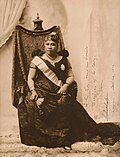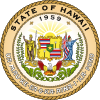Portal:Hawaii
The Hawaii Portal Hawaii (/həˈwaɪ.i/ ⓘ hə-WY-ee; Hawaiian: Hawaiʻi [həˈvɐjʔi, həˈwɐjʔi]) is an island state of the United States, in the Pacific Ocean about 2,000 miles (3,200 km) southwest of the U.S. mainland. It is the only state not on the North American mainland, the only state that is an archipelago, and the only state in the tropics. Hawaii consists of 137 volcanic islands that comprise almost the entire Hawaiian archipelago (the exception, which is outside the state, is Midway Atoll). Spanning 1,500 miles (2,400 km), the state is physiographically and ethnologically part of the Polynesian subregion of Oceania. Hawaii's ocean coastline is consequently the fourth-longest in the U.S., at about 750 miles (1,210 km). The eight main islands, from northwest to southeast, are Niʻihau, Kauaʻi, Oʻahu, Molokaʻi, Lānaʻi, Kahoʻolawe, Maui, and Hawaiʻi, after which the state is named; the latter is often called the "Big Island" or "Hawaii Island" to avoid confusion with the state or archipelago. The uninhabited Northwestern Hawaiian Islands make up most of the Papahānaumokuākea Marine National Monument, the largest protected area in the U.S. and the fourth-largest in the world. Of the 50 U.S. states, Hawaii is the eighth-smallest in land area and the 11th-least populous; but with 1.4 million residents, it ranks 13th in population density. Two-thirds of Hawaii residents live on O'ahu, home to the state's capital and largest city, Honolulu. Hawaii is among the country's most diverse states, owing to its central location in the Pacific and over two centuries of migration. As one of only six majority-minority states, it has the only Asian American plurality, the largest Buddhist community, and largest proportion of multiracial people in the U.S. Consequently, Hawaii is a unique melting pot of North American and East Asian cultures, in addition to its indigenous Hawaiian heritage. Settled by Polynesians sometime between 1000 and 1200 CE, Hawaii was home to numerous independent chiefdoms. In 1778, British explorer James Cook was the first known non-Polynesian to arrive at the archipelago; early British influence is reflected in the state flag, which bears a Union Jack. An influx of European and American explorers, traders, and whalers soon arrived, leading to the decimation of the once-isolated indigenous community through the introduction of diseases such as syphilis, tuberculosis, smallpox, and measles; the native Hawaiian population declined from between 300,000 and one million to less than 40,000 by 1890. Hawaii became a unified, internationally recognized kingdom in 1810, remaining independent until American and European businessmen overthrew the monarchy in 1893; this led to annexation by the U.S. in 1898. As a strategically valuable U.S. territory, Hawaii was attacked by Japan on December 7, 1941, which brought it global and historical significance, and contributed to America's entry into World War II. Hawaii is the most recent state to join the union, on August 21, 1959. In 1993, the U.S. government formally apologized for its role in the overthrow of Hawaii's government, which had spurred the Hawaiian sovereignty movement and has led to ongoing efforts to obtain redress for the indigenous population. (Full article...) This is a Featured article, which represents some of the best content on English Wikipedia..
J. R. Kealoha (died March 5, 1877) was a Native Hawaiian and a citizen of the Kingdom of Hawaiʻi, who became a Union Army soldier during the American Civil War. Considered one of the "Hawaiʻi sons of the Civil War", he was among a group of more than one hundred documented Native Hawaiian and Hawaiʻi-born combatants who fought in the American Civil War while the Kingdom of Hawaiʻi was an independent nation. Kealoha enlisted in the 41st United States Colored Infantry, a United States Colored Troops regiment formed in Pennsylvania. Participating in the siege of Petersburg, he and another Hawaiian soldier met the Hawaiʻi-born Colonel Samuel Chapman Armstrong, who recorded their encounter in a letter home. With the 41st USCT, Kealoha was present at the surrender of Confederate General Robert E. Lee and the Army of Northern Virginia at Appomattox Court House on April 9, 1865. After the war, Kealoha returned to Hawaiʻi. He died on March 5, 1877, and was buried in an unmarked grave in Honolulu's Oʻahu Cemetery. (Full article...)This is a Good article, an article that meets a core set of high editorial standards.
 Joseph Kahoʻoluhi Nāwahī (January 13, 1842 – September 14, 1896), also known by his full Hawaiian name Iosepa Kahoʻoluhi Nāwahīokalaniʻōpuʻu, was a Native Hawaiian nationalist leader, legislator, lawyer, newspaper publisher, and painter. Through his long political service during the monarchy and the important roles he played in the resistance and opposition to its overthrow, Nāwahī is regarded as an influential Hawaiian patriot. Born on the island of Hawaii, Nāwahī received his formal education in the Protestant missionary schools of the islands. He began his career as a teacher at the Hilo Boarding School and later became a self-taught lawyer. He was also an accomplished artist, and was one of the few indigenous Hawaiian painters to work in Western styles during the 19th century. Entering the realm of politics in 1872 as a member of the House of Representatives, he represented his home districts of Puna and later Hilo in the Legislature of the Kingdom of Hawaii for two decades. Serving in the final legislative assembly 1892–1893, he became a political leader for the Liberal faction in the government. He established himself as a leader in the opposition to the unpopular Bayonet Constitution of 1887 and as a defender of the idea of Hawaiian nationhood and self-rule. Alongside William Pūnohu White, he was a principal author of the proposed 1893 Constitution with Queen Liliʻuokalani. They were decorated Knight Commanders of the Royal Order of Kalākaua for their service and contribution to the monarchy. Three days after an attempted promulgation of the constitution, the queen was deposed during the overthrow of the Kingdom of Hawaii on January 17, 1893. (Full article...)Selected Picture - 'Ōlelo (Language) -This section is here to highlight some of the most common words of the Hawaiian Language, ʻŌlelo, that are used in everyday conversation amongst locals.
Aloha
Love, hello, goodbye Aloha kakahiaka, Good morning; Aloha ahiahi, Good evening; Aloha Akua, Love of God State Facts
State Symbols:
Selected article -Israel Kaʻanoʻi Kamakawiwoʻole (May 20, 1959 – June 26, 1997), also called Braddah IZ or just simply IZ, was a Native Hawaiian musician and singer. He achieved commercial success and popularity outside of Hawaii with his 1993 studio album, Facing Future. His medley of "Somewhere Over the Rainbow/What a Wonderful World" was released on his albums Ka ʻAnoʻi and Facing Future, and was subsequently featured in various media. The song has had 358 weeks on top of the World Digital Songs chart, making it the longest-leading number-one hit on any of the Billboard song charts. Kamakawiwoʻole is regarded as one of the greatest musicians from Hawaii and is the most successful musician from the state. Along with his ukulele playing and incorporation of other genres, such as jazz and reggae, Kamakawiwoʻole remains influential on Hawaiian music. He was named "The Voice of Hawai‘i" by NPR in 2010. (Full article...)Did you know? -
Hawaii News
Wikinews Hawaii portal
Quotes - "The people to whom your fathers told of the living God, and taught to call 'Father,' and whom the sons now seek to despoil and destroy, are crying aloud to Him in their time of trouble; and He will keep His promise, and will listen to the voices of His Hawaiian children lamenting for their homes." — Queen Liliʻuokalani On this day...There are no anniversaries listed for this day. Related portalsTopicsCategoriesAssociated WikimediaThe following Wikimedia Foundation sister projects provide more on this subject:
SourcesDiscover Wikipedia using portals |























